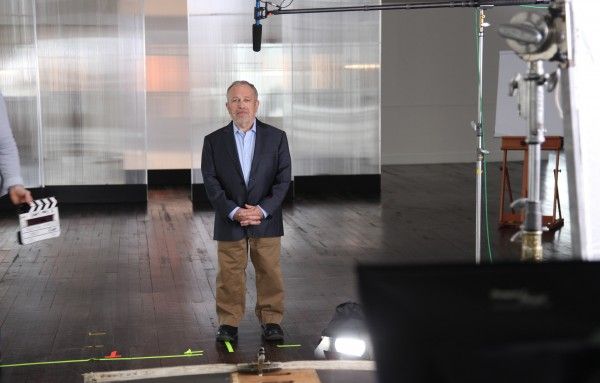I don't know what other people don't know. I can't cite empirical data regarding the knowledge or ignorance of a potential audience. Viewers coming into Jacob Kornbluth's documentary Inequality for All will find Robert Reich's explanation of wealth disparity an eye-opening experience or a remedial course with nice visual aids. The film is transparently an advocacy documentary, and it won't change the minds of viewers who are convinced that Reich is a communist or a socialist (also because people who level those charges usually don't know the definition of a communist or socialist). Kornbluth finds an affable lead figure in the diminutive Reich, but his well-spoken lesson only leads to facile solutions.
Based on Reich's book Aftershock, Inequality for All brings us into the Berkeley professor's classroom where he lays out his lecture: What is wealth disparity, why is it happening, and is it good or bad? Kornbluth occasionally cuts into the lecture with personal stories from Reich about his youth, why he got into politics, his work as Labor Secretary in the Clinton administration, and his passion for the issue of income inequality. The director and Reich work together to make their lesson entertaining, informative, and—believing they've done their job correctly—a call to action.
Inequality for All is a very well-made film. Kornbluth does a fantastic job with clean, vector graphic visual aids that go along with Reich's arguably dry explanation of changing percentages as they relate to American wealth over the course of the 20th century. Even for those who understand the larger points presented in the film, these breakdowns provide compelling facts in a clear, concise fashion. Some audience members may already know "The Virtuous Cycle" of how helping the middle class ultimately helps the economy, but Kornbluth deserves credit for effectively illustrating Reich's explanation.
Putting Reich front-and-center is also a smart move. It's not simply that Reich is smart; he's also endearing. In An Inconvenient Truth, Al Gore has to prove he has a personality, and even then he's throwing a dull slideshow at us. Reich has always had a big sense of humor about his small stature, and he's just as comfortable providing an editorial on a serious news programs like NPR's Marketplace as he is doing a buddy-cop sketch on Late Night with Conan O'Brien. Reich has credibility and charisma, and it almost feels like a bit of a waste to see him simply go through the basics of his topic rather than expand into its intricacies and nuances.
It's important that we all have a basic knowledge of wealth inequality, but Inequality for All never pushes beyond its intro-level course. Audiences seeking to explore more complicated questions will be left wanting. Granted, the whole purpose of Kornbluth's direction is to make the issue as easy to understand as possible, and if the movie had a "sequel", I would like to see the director tackle more difficult issues like explaining how speculation and other convoluted financial instruments manipulate our economy. When people don't understand how speculation can artificially increase the price of oil, the tutelage of a film like Inequality for All could be invaluable.
Kornbluth has created an effective teaching tool, but as an advocacy documentary, Inequality for All comes to obvious conclusions and tired recommendations. I can't measure what a theoretical audience will know going into the movie, but I have to believe that most people know how much power lobbyists have in Washington. Anyone who would want to see a documentary featuring Robert Reich is probably aware of the Citizens United ruling. Inequality for All also falls into the same trap as many other advocacy docs: 95% devoted to explaining the problem, 5% to proposing solutions to the problem, and please visit the official website for more.
At the outset of Reich's lecture, he promises to challenge preconceived notions of wealth inequality that expand beyond liberals and conservatives. Conservatives will never warm to this movie, and liberals already agree with its premise, so it's not even-handed to simply point to the understandable anger coming from both the Tea Party and Occupy Wall Street. More importantly, when it comes to preconceived notions, it's a presumption on the part of the filmmakers that the incoming audience is ignorant about the issue. If that's the case, Inequality for All, it a rich 88 minutes of well-presented information. For those already familiar with the issue and would like some more insight, there's simply not enough.
Rating: C+
Click here for all our Sundance 2013 coverage. Click on the corresponding links for my previous reviews:



